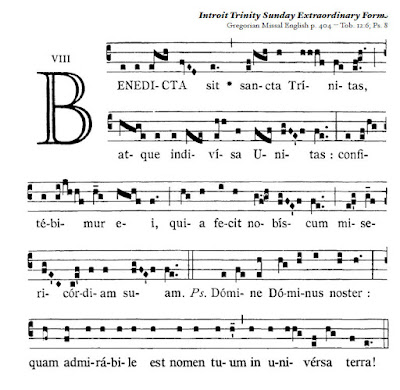Sung by Schola Bellarmina:
Te Deum laudamus:(English translation from the 1662 Book of Common Prayer.)
te Dominum confitemur.
Te aeternum Patrem
omnis terra veneratur.
Tibi omnes Angeli;
tibi caeli et universae Potestates;
Tibi Cherubim et Seraphim
incessabili voce proclamant:
Sanctus, Sanctus, Sanctus,
Dominus Deus Sabaoth.
Pleni sunt caeli et terra
maiestatis gloriae tuae.
Te gloriosus Apostolorum chorus,
Te Prophetarum laudabilis numerus,
Te Martyrum candidatus laudat exercitus.
Te per orbem terrarum
sancta confitetur Ecclesia,
Patrem immensae maiestatis:
Venerandum tuum verum et unicum Filium;
Sanctum quoque Paraclitum Spiritum.
Tu Rex gloriae, Christe.
Tu Patris sempiternus es Filius.
Tu ad liberandum suscepturus hominem,
non horruisti Virginis uterum.
Tu, devicto mortis aculeo,
aperuisti credentibus regna caelorum.
Tu ad dexteram Dei sedes, in gloria Patris.
Iudex crederis esse venturus.
Te ergo quaesumus, tuis famulis subveni:
quos pretioso sanguine redemisti.
Aeterna fac cum sanctis tuis in gloria numerari.
Salvum fac populum tuum,
Domine, et benedic hereditati tuae.
Et rege eos, et extolle illos usque in aeternum.
Per singulos dies benedicimus te;
Et laudamus Nomen tuum in saeculum, et in saeculum saeculi.
Dignare, Domine, die isto sine peccato nos custodire.
Miserere nostri Domine, miserere nostri.
Fiat misericordia tua,
Domine, super nos, quemadmodum speravimus in te.
In te, Domine, speravi:
non confundar in aeternum.
We praise thee, O God :
we acknowledge thee to be the Lord.
All the earth doth worship thee :
the Father everlasting.
To thee all Angels cry aloud :
the Heavens, and all the Powers therein.
To thee Cherubim and Seraphim :
continually do cry,
Holy, Holy, Holy :
Lord God of Sabaoth;
Heaven and earth are full of the Majesty :
of thy glory.
The glorious company of the Apostles : praise thee.
The goodly fellowship of the Prophets : praise thee.
The noble army of Martyrs : praise thee.
The holy Church throughout all the world :
doth acknowledge thee;
The Father : of an infinite Majesty;
Thine honourable, true : and only Son;
Also the Holy Ghost : the Comforter.
Thou art the King of Glory : O Christ.
Thou art the everlasting Son : of the Father.
When thou tookest upon thee to deliver man :
thou didst not abhor the Virgin's womb.
When thou hadst overcome the sharpness of death :
thou didst open the Kingdom of Heaven to all believers.
Thou sittest at the right hand of God : in the glory of the Father.
We believe that thou shalt come : to be our Judge.
We therefore pray thee, help thy servants :
whom thou hast redeemed with thy precious blood.
Make them to be numbered with thy Saints : in glory everlasting.
O Lord, save thy people :
and bless thine heritage.
Govern them : and lift them up for ever.
Day by day : we magnify thee;
And we worship thy Name : ever world without end.
Vouchsafe, O Lord : to keep us this day without sin.
O Lord, have mercy upon us : have mercy upon us.
O Lord, let thy mercy lighten upon us :
as our trust is in thee.
O Lord, in thee have I trusted :
let me never be confounded.











